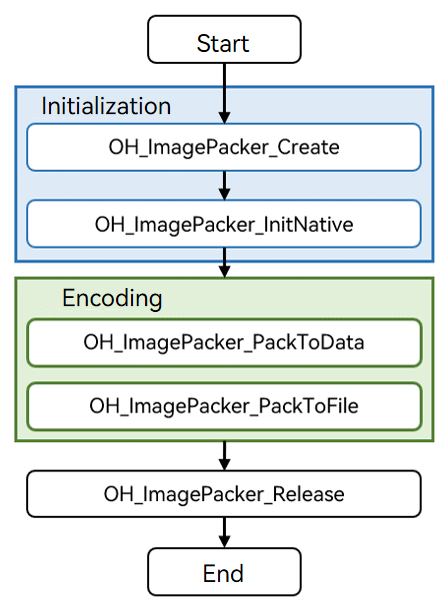Image Encoding (C/C++)
You can call the native APIs provided by the ImagePacker module to encode images, that is, to compress a PixelMap object into an image in the desired format.
Currently, JPEG, WebP, and PNG encoding formats are supported.
Usage Scenario
-
Image codec conversion
Import an image source, and encapsulate it into the desired format.
-
Image editing
Edit a PixelMap object, and export an image in the desired format.
How to Develop
Read ImagePacker for the API reference.
Refer to the code snippet below to complete the entire image encoding process, including creating an encoder, initializing resources, performing encoding, and destroying the encoder.
During application development, you must call the APIs in the defined sequence. Otherwise, an exception or undefined behavior may occur.
The figure below shows the call relationship of image encoding.

Linking the Dynamic Library in the CMake Script
target_link_libraries(sample PUBLIC libimage_packer_ndk.z.so)
How to Develop
-
Add the header file image_packer_mdk.h.
// Add the header file image_packer_mdk.h. #include "multimedia/image_framework/image_packer_mdk.h" -
Create an encoder instance.
You must use napi_env to create an encoder.
// Use napi_value to undertake the created encoder instance. napi_value packer; // Use napi_env to create an encoder. If result is IMAGE_RESULT_SUCCESS, the encoder is created. int32_t result = OH_ImagePacker_Create(env, &packer); -
Initialize resources.
Call OH_ImagePacker_InitNative to initialize the native encoder instance.
// Initialize the native instance through napi_env and the created encoder instance. ImagePacker_Native* nativePacker = OH_ImagePacker_InitNative(env, packer); -
Perform encoding.
The following input parameters are provided for the encoding APIs:
-
ImagePacker_Native instance obtained
-
Image source (napi_value), PixelMap object, or** ImageSource** object (when CreatePixelMap is not called yet) to be encoded
-
Encoding parameters, including the encoding format and encoding quality
The encoding APIs can output data to the buffer (memory) or a file. They have the same input parameters, as described previously. You can select either of them as required.
Example: output data to the buffer (memory)
// Encoding parameters struct ImagePacker_Opts_ opts; // (Mandatory) Configure the encoding format. opts.format = "image/jpeg"; // (Mandatory) Configure the encoding quality. opts.quality = 100; // Set the output buffer size, for example, to 4 KB. size_t bufferSize = 4*1024; // Apply for a buffer for image encoding. uint8_t* outData = (uint8_t *)(malloc(bufferSize)); // Start to encode the input source. If IMAGE_RESULT_SUCCESS is returned, the encoding is successful. In this case, bufferSize indicates the size of the buffer used for encoding. int32_t result = OH_ImagePacker_PackToData(nativePacker, source, &opts, outData, &bufferSize);Example: output data to a file
// Encoding parameters struct ImagePacker_Opts_ opts; // (Mandatory) Configure the encoding format. opts.format = "image/jpeg"; // (Mandatory) Configure the encoding quality. opts.quality = 100; // Open the file to which the data will be written. (Ensure that the application has the permission to access the file path.) int fd = open("/data/test.jpg", O_RDWR | O_CREAT, S_IRUSR | S_IWUSR); if (fd >= 0) { // Start to encode the input source. If IMAGE_RESULT_SUCCESS is returned, the encoding is successful. int32_t result = OH_ImagePacker_PackToFile(nativePacker, source, &opts, fd); // Close the file. close(fd); } -
-
Destroy the encoder instance and release resources.
NOTE
You only need to call the API once.
// Call OH_ImagePacker_Release to destroy the encoder. int32_t ret = OH_ImagePacker_Release(nativePacker); if (result != IMAGE_RESULT_SUCCESS) { // Exception handling. } else { nativePacker = NULL; // The encoder cannot be destroyed repeatedly. }